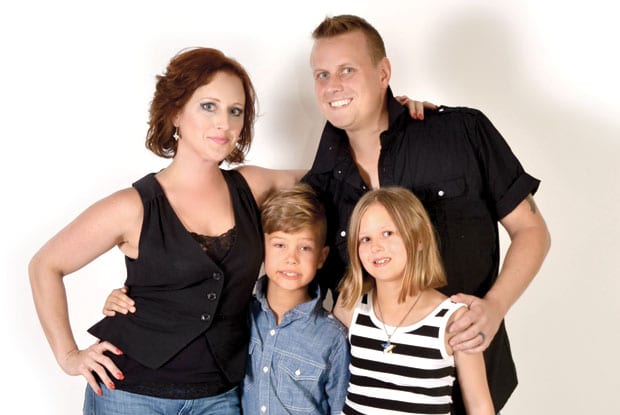Nikki Araguz seeks to have marriage to late husband recognized in what advocate calls ‘incredibly important’ case for transgender equality

COURTHOUSE WEDDING | Nikki Araguz plans to marry William Loyd after the hearing on Sept. 18. She announced the plans and introduced her new family this week that will include Charlotte, 9, and Cash, 8.
ANNA WAUGH | News Editor
Transgender widow Nikki Araguz’s battle to have her marriage recognized by the state in order to receive her late husband’s death benefits is moving a step forward next week.
The 13th District Court of Appeals in Corpus Christi will hear her case on Sept. 18.
Araguz is appealing a 2011 ruling by Houston state district Judge Randy Clapp, who ruled that Araguz was born male and Texas’ 2005 marriage amendment doesn’t recognize her marriage to a man. Her 2008 marriage to her late husband, Thomas Araguz III, became invalid. Thomas Araguz was a volunteer firefighter in Wharton and was killed in the line of duty in 2010.
Thomas Araguz’s ex-wife, Heather Delgado, then sued to have the marriage declared void so she would receive widow’s benefits instead of Nikki Araguz. Delgado claimed that she needed the benefits to provide for her two children with Thomas Araguz.
After next week’s hearing, Araguz will marry fiancé William Loyd outside the courthouse to make the statement that if she can legally marry a man, her previous marriage should also be recognized by the state, according to a press release. Araguz did not return calls seeking comment.
Houston attorney Kent Rutter, the lead attorney for the appeal, said Texas law is on the side of Araguz.
Clapp’s ruling hinged on the 1999 Texas Court of Appeals decision in Littleton v. Prange, which found that since a male who transitioned to female was born male, she was therefore still male. Her marriage to a male was therefore invalid because same-sex marriages are invalid under state law.
But Rutter said the Texas Legislature opened the door for transgender marriage in 2009 when it added documentation of a sex change to the identification documents people can present to obtain a marriage license. He said the 2009 statute voids the Littleton ruling.
“It is our belief that under the law of Texas, Nikki Araguz is a woman and she had a valid marriage to a man,” Rutter said.
Transgender Houston lawyer Phyllis Frye said the Littleton ruling is problematic because it allows a trans woman who has had a sex change to marry another woman, which would be considered same-sex marriage. But because the ruling only recognizes the person’s birth sex, it views the union as an opposite-sex marriage.
“In my opinion, the 1999 Littleton court was of a mindset that transsexuals are only male to female gay folks who will do anything to marry their queer men boyfriends,” Frye said. “In other words, the Littleton court saw sex change surgery as being a queers’ dodge to legalize their gay marriage.”
In response to Araguz’s case, a bill was introduced in the Texas Legislature in 2011 to ban transgender marriage. The bill would have removed proof of a sex change from the list of documents that can be used to obtain marriage licenses. A similar bill was introduced this year, but like the one from 2011, it never made it to the floor for a vote.
There is also the issue of Araguz’s birth certificate.
Cristan Williams, director of Houston’s Transgender Center, said the original ruling relied on Littleton and therefore Araguz’s original birth certificate. Araguz was born in California and was originally listed as male on her birth certificate, but had it amended before her marriage to indicate that she is female.
Williams said Texas records keep an original birth certificate on file even if a new one is issued with changes, but California views some changes as mistakes and amends them, issuing a new original certificate. Therefore, Williams said Clapp should’ve recognized Araguz’s original California birth certificate that listed her as female. She said the only original certificate that exists in California is the one listing Araguz as female.
Republican Texas Attorney General Greg Abbott has declined to weigh in on transgender marriage cases.
In 2010, the El Paso County clerk requested a ruling from Abbott about whether to grant a marriage license to a transgender woman and a cisgender woman. But Abbott opted not to weigh in, saying he would wait for court rulings in the Araguz case.
Abbott’s decision has led transgender advocates, like Williams, to place their faith in a positive appeal ruling because of its wide-reaching significance.
“That means the result of the appeals court could affect the transition status of transgender people throughout the state of Texas,” Williams said. “I think that this case is incredibly important not only to transgender people throughout Texas, but transgender people throughout the nation.”
Rutter said after the hearing next week the court doesn’t have a deadline to issue a ruling. He said Araguz’s legal team will review the decision and could appeal to the Texas Supreme Court.
“It could be weeks, months or years,” he said. “But I don’t think it’ll be years. We’re more concerned with them getting this right than making a quick decision.”
This article appeared in the Dallas Voice print edition September 13, 2013.

